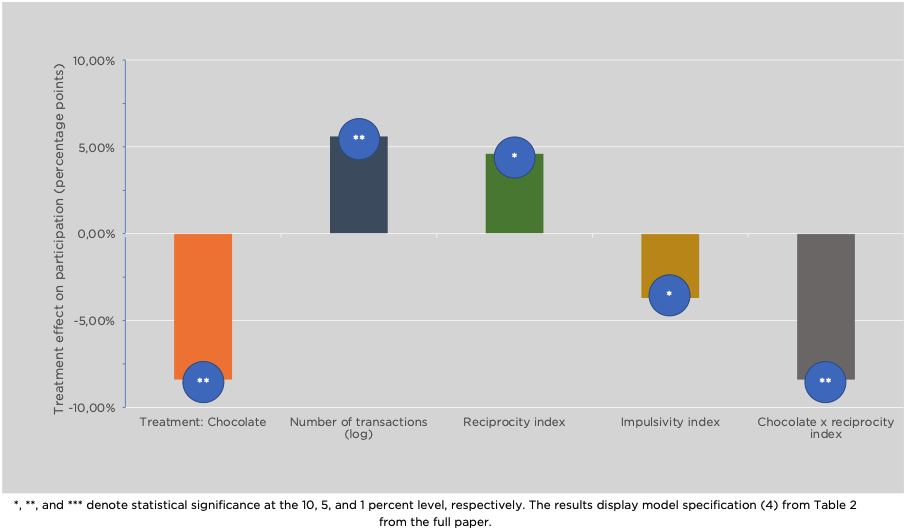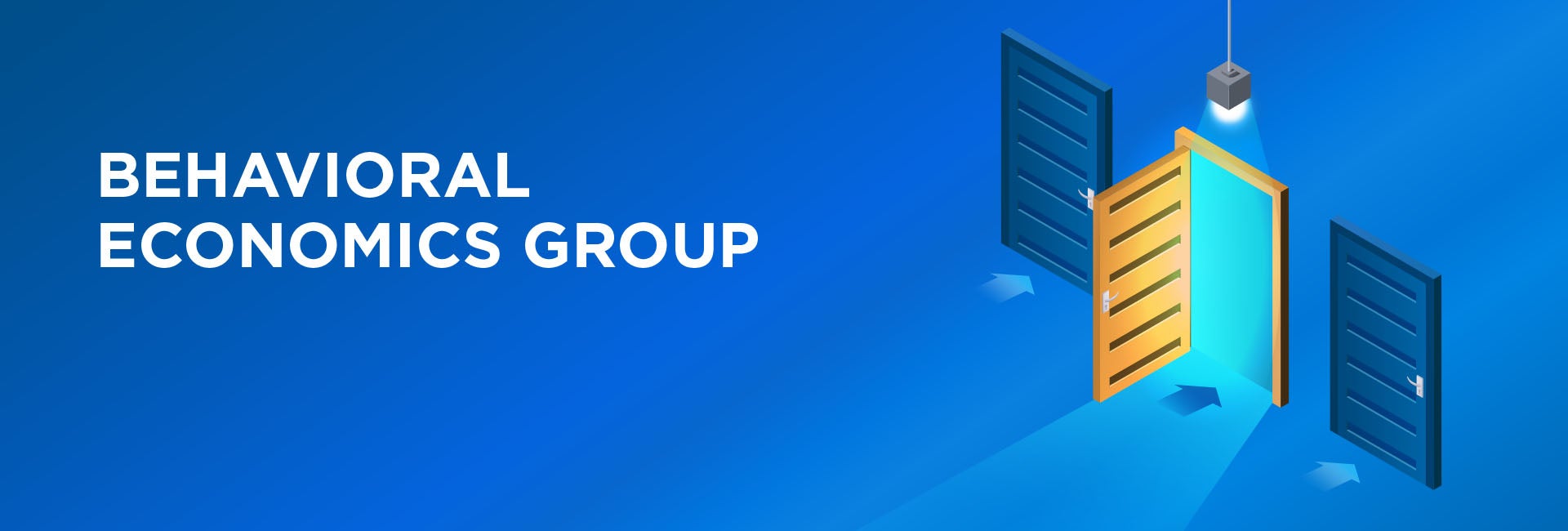When the context backfires: Experimental evidence on Reciprocity

Context
For many public policy issues, solutions exist but take-up by citizens is limited. Typical examples range from free vaccination programs to vocational training offers. For instance, take-up of free business training programs for micro-entrepreneurs is reported to be at only two-thirds. Increasing take-up of these policies would not only benefit the individuals participating in the programs, but would also produce societal benefits with a higher program efficiency and positive externalities.
Many explanations of low take-up evolve around limited knowledge, lack of trust, structural impediments, and behavioral barriers. It is of tantamount experience to advance research on approaches that overcome these issues to facilitate more effective policies.
The Project
This project addressed behavioral barriers of low take-up. It used a behaviorally informed intervention that was aimed at increasing the participation rates in business training programs for micro-entrepreneurs by offering a gift that should activate a norm of reciprocity. The study took place in Ecuador between 2015 and 2016.
Behavioral Analysis
Behavioral Barriers
Hassle factors: We frequently do not act on our intentions because of small factors or inconveniences that hinder us or make it uncomfortable. This could simply be the way in which the information is presented, the length of its presentation, or that additional actions must be taken to execute a decision. In this case, micro-entrepreneurs might be prevented from participating in business trainings by the distance to the location or the time investment.
Other Barriers
Lack of information: People may lack relevant information, for instance, because information is difficult to obtain, scarce, or hard to understand. Micro-entrepreneurs might not be aware of the potential benefits they can obtain in business trainings.
Behavioral Tools
Simplification: Reducing the effort required to perform an action by making the message clearer, cutting the number of steps or breaking a complex action down into simple, easier steps. In this case, providing the business owners with a free ride to and from the training location was aimed at simplifying the steps in participating.
Personalization: Personalizing information based on individual characteristics and traits of identity are shown to improve responsiveness and outcomes. This could take the form of approaching someone by using their name, nationality, or profession, among other characteristics. In this case, the invitation letters to the micro-entrepreneurs were personalized to increase their interest and participation.
Reciprocity: This is a social norm of in-kind exchange among individuals, particularly when one person's action is met by an equivalent action from another person. It is generally associated with positive reactions—for example, returning a favor with an equivalent favor. However, it can also involve negative reactions, such as punishing another individual for negative action. In this case, the chocolate gift in the treatment group was designed to activate positive reciprocity. The latter is assumed to increase the micro-entrepreneurs’ willingness to “return the favor” and participate in the training.
Reminders: consist of an email, text messages, a letter, or a personal visit to remind the person making the decision about some aspect of their decision-action. These are aimed at mitigating procrastination, forgetfulness, and cognitive overload for those who must make the decisions. The micro-entrepreneurs were contacted via phone and reminded of the upcoming training session.
Intervention Design
The intervention was part of a wider effort to provide business trainings to micro-entrepreneurs in Ecuador. In this study, the sample consisted of 793 entrepreneurs from various economic sectors. All of them were non-bank correspondents, which means that they are contracted by a financial institution to channel and process financial transactions of the bank’s clients.
Participants were randomized into a control and a treatment group and stratified at the bank officer level (n=12). One bank officer is responsible for 66 micro-entrepreneurs. All participants received the information. The treatment group additionally received a chocolate gift handed over by the bank officers when they provided the micro-entrepreneurs with the invitation to the training. The chocolate was intended to signal appreciation and activate the norm of reciprocity.
The baseline gathered information between August and October 2015 and included questions on business characteristics and stores' current operational results. Ten days before a personalized training session, all 793 business owners received a hand-delivered invitation that contained essential information on the training (date, time, address). In addition, participants were offered free rides to and from the training location. Business owners were also contacted via phone to confirm that they had received the invitation and to remind them to participate. The training, free of cost and voluntary, took place in December 2015 and consisted of a single four-hour session. Finally, an endline survey was conducted one year after the training, between November and December 2016.
The study assessed participants’ impulsivity and inclination to reciprocate negatively or positively to better understand underlying causal mechanisms. Results are reported from regression analysis with strata at bank manager level and include several controls, such as the number of monthly transactions.
Challenges
- Impulsivity was included because of an unexpected development that occurred shortly before the training session was scheduled to take place. The financial institution had changed the electronic devices used to process financial transactions, which caused system-wide issues and income losses for the micro-entrepreneurs. The average number of transactions in November 2015, just a few weeks before the training, dropped by 8.9 percent. It is likely that this issue and how it was dealt with by the bank officers had created a tense, adversarial relationship with the participants.
- The changes in processing financial transactions are important contextual events that seem to have significantly impacted the intervention’s desired effect on participation in the business training sessions.
Results
- Results show a negative and statistically significant effect of handing over a chocolate bar on participation rates in the business trainings.
- The coefficient of the treatment is associated with an 8.3 percentage points (pp) reduction in the participation rate. This effect is robust to different model specifications.
- These results seem to be driven by reactions of business owners to the recent issues with processing financial transactions (Figure 1).
- Impulsivity of business owners was associated with lower rates of attendance, which can be interpreted as an inclination to react harshly to perceived unfairness (the income losses caused by changing the devices).
- For those who were in the treatment group, thus receiving the chocolate gift, and score high on reciprocity, for an increase in one standard deviation in the reciprocity index, the likelihood to participate was reduced by 8.4 pp. These results are in line with previous research that had shown that high values of positive reciprocity are associated with strong reactions to perceived unfairness.
Figure 1. Effects on Participation in Business Training Programs

Policy Implications
- Interventions do not take place in a vacuum but are always embedded in a context. Specifically, recent events can be important in shaping the trajectory of an intervention and might limit the usefulness of behavioral interventions.
- Reciprocity, while mostly associated with beneficial tit-for-tat considerations, can also backfire.
- Relationships are important. Particularly when triggering the social norm of reciprocity, interventions are not invulnerable to negative shocks in the personal relationships of the parties involved, which, in turn, might strongly affect the outcome.
- Finally, this study demonstrates the importance of publishing surprising results that are not in line with the initial hypotheses. Like hypothesis-confirming results, unexpected results help to advance evidence-based knowledge.
